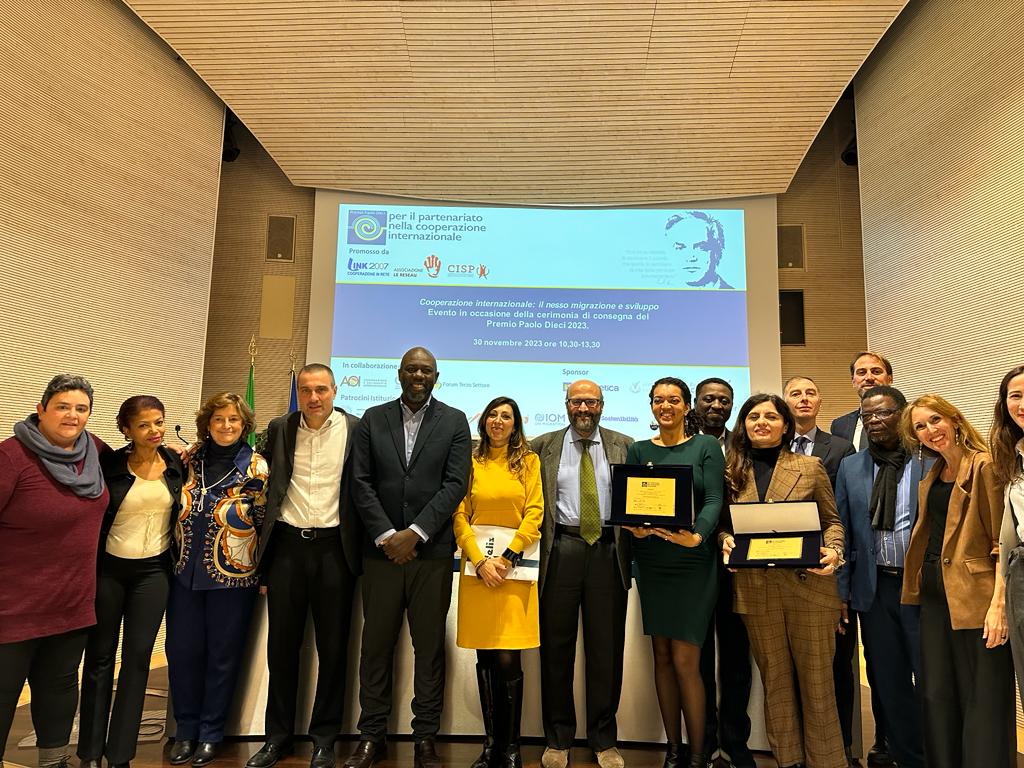International Cooperation: the nexus of migration and development
On the occasion of the Paolo Dieci 2023 Award ceremony, a round table on the migration and development nexus in international cooperation was held yesterday in Rome at the Farnesina

Rome, 1 December 2023- On the occasion of the final award ceremony of the Paolo Dieci 2023 Prize, a round table on the nexus migration and development in international cooperation was held yesterday at the Farnesina. The panel, moderated by Stefano Arduini, Director of VITA, was attended by institutional presences such as the Deputy Director General/Central Director for Migration Policies and International Mobility, DGIT, Stefano Bianchi, Marco Rusconi, Head of the Africa Office and Vicar of the VDG/DC for bilateral development cooperation policies and emergency interventions, DGCS. The round table also featured Sandro De Luca, Director of CISP – International Committee for the Development of Peoples, Annachiara Moltoni, Head of ELIS NGO – Inclusive Development and Sustainability, Cleophas Adrien Dioma, President of Le Réseau Association.
“Migration is an integral part of development processes; it is a phenomenon that deeply affects every country; societies that generate migratory flows are experiencing profound changes in their economic and social systems. Thinking of cooperation as an instrument to reduce migratory flows in the short term has proved ineffective, while it remains an absolutely fundamental tool to support positive processes. However, a different look is needed. Migration cannot only be seen as a problem and a pathology,’ Sandro De Luca explains.
He then underlined the need to look at migration from a different perspective, especially through the eyes of young Africans who perceive migration as an opportunity to seek a better future for themselves. It is precisely this perspective that is crucial in directing international cooperation initiatives towards the creation of systems of job, employment and business opportunities that are visible and concrete for young people. Opportunities in their own countries or in the region, but also, through innovative regulatory instruments, creating possibilities for regular migration as one of the possibilities. Dialogue with young people in the countries and with civil society, along with dialogue with governments, remains a key instrument. De Luca emphasised the need to invest time and resources in networking and collaboration between cooperation actors. It is precisely to build these systems of opportunities that a group of CSOs from LINK 2007 is building a project that seeks to translate these principles into concrete actions, involving NGOs, networks of youth organisations and local institutions, microfinance institutions and diasporas. This synergetic approach, in which all components work together in a cohesive manner, is essential for a concrete and sustainable system of opportunities to emerge.
“It is imperative to first of all consider that migration is a structural phenomenon in the history and economy of countries. We need to perceive migration as a reaction to the wide imbalances that characterise our economies and social systems, with a particular focus on global labour market imbalances,” says Annachiara Moltoni, Head of ELIS NGO – Inclusive Development and Sustainability. She went on to underline a second key factor: “We are witnessing a change in the nature of migration, which is increasingly becoming a circular phenomenon. Countries of origin are no longer just points of departure, but are becoming destinations of return. In this perspective, we can no longer consider the migration phenomenon in isolation. The ELIS director went on to elaborate on a third crucial element: ‘We must integrate the economic component into the migration phenomenon. The triple win approach becomes essential.”
In this perspective, regular labour migration emerges as a key component, paving the way for a more targeted and effective approach.
“As a representative of the small and medium-sized enterprises of the Diaspora, I am well aware of the difficulties that Diasporas face every day and I clearly think that these realities need Italian cooperation. We are already operating in the territories and have also contributed to the creation of territorial networks because it is very important for us to have realities that are part of the Italian territory. In this sense, the Mattei Plan represents only a small part of the history of Italian cooperation’s relationship with the world,’ comments Cleo Adrien Dioma, President of Le Réseau Association.
The high-level speeches at the round table highlighted the need for an integrated approach to migration. Among the main objectives, the focus remained on the importance of governing and regulating migratory flows with appropriate channels, as also explained by Deputy Director Stefano Bianchi.
“Speaking of the nexus migration and development, the word intertwining comes to mind. This word, I think, renders very well the synergies and overlaps that there are between cooperation and migration,’ says Marco Rusconi. He goes on to comment, ‘in our system of cooperation, as also mentioned in Law 125/2014, we talk about cooperation subjects. First of all, the migrant is a subject, and diaspora organisations are actors that can make contributions to the policy-maker to steer the course. Italy is still a little behind from this point of view. Today, training is a fundamental key for the growth and accompaniment of the person in the world of work, but also an incentive and inclination to entrepreneurship’. In closing, the Head of the Africa Office and Vicar of the VDG/DC, reflecting on the Mattei Plan, emphasised: “It is crucial to include diasporas within the Plan, highlighting the importance of partnership. Working with an integrated, multi-level and multi-actor approach remains crucial in international cooperation, especially when dealing with migration.”
READ THE ARTICLE PUBLISHED IN VITA HERE
For further information:
Mail: comunicazione@link2007.org
Tel: +39 3271825646
